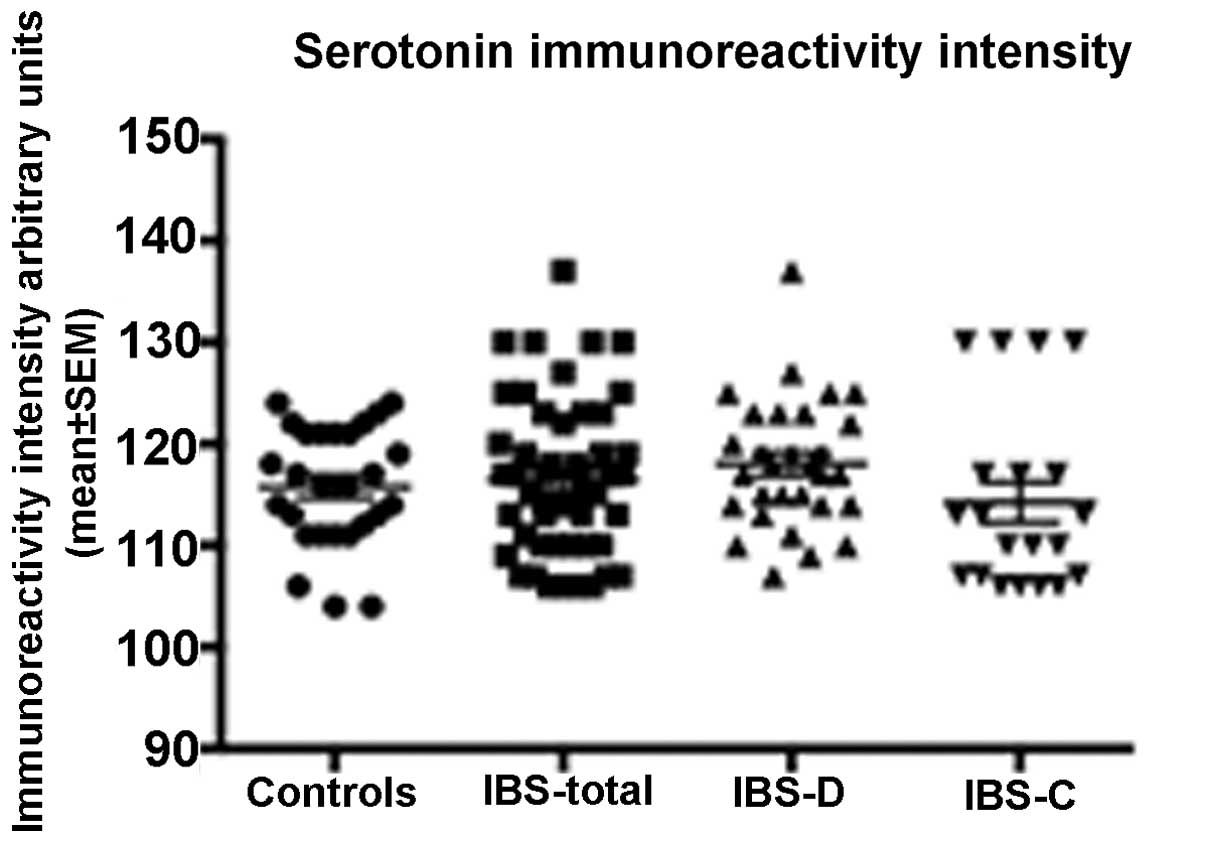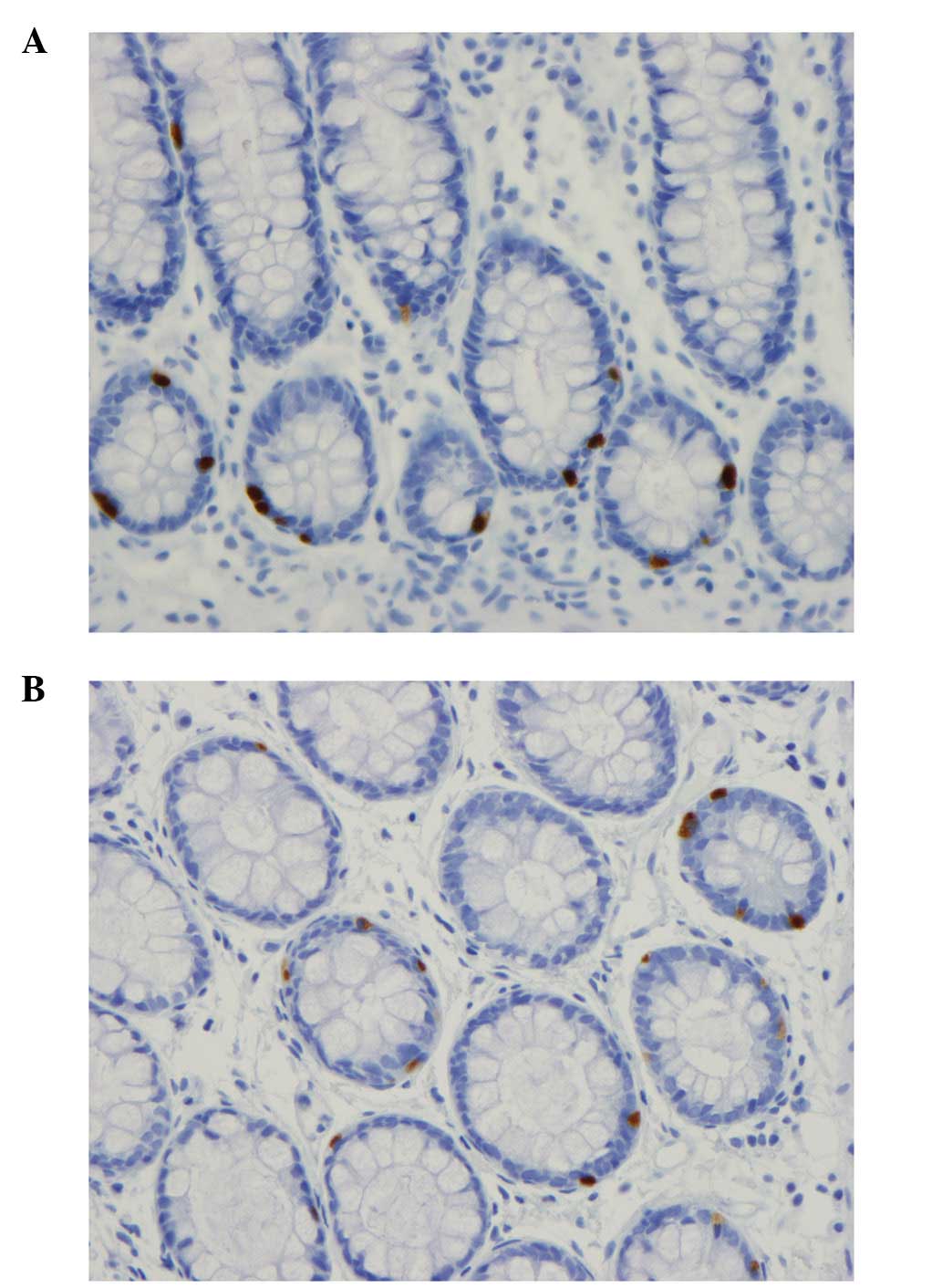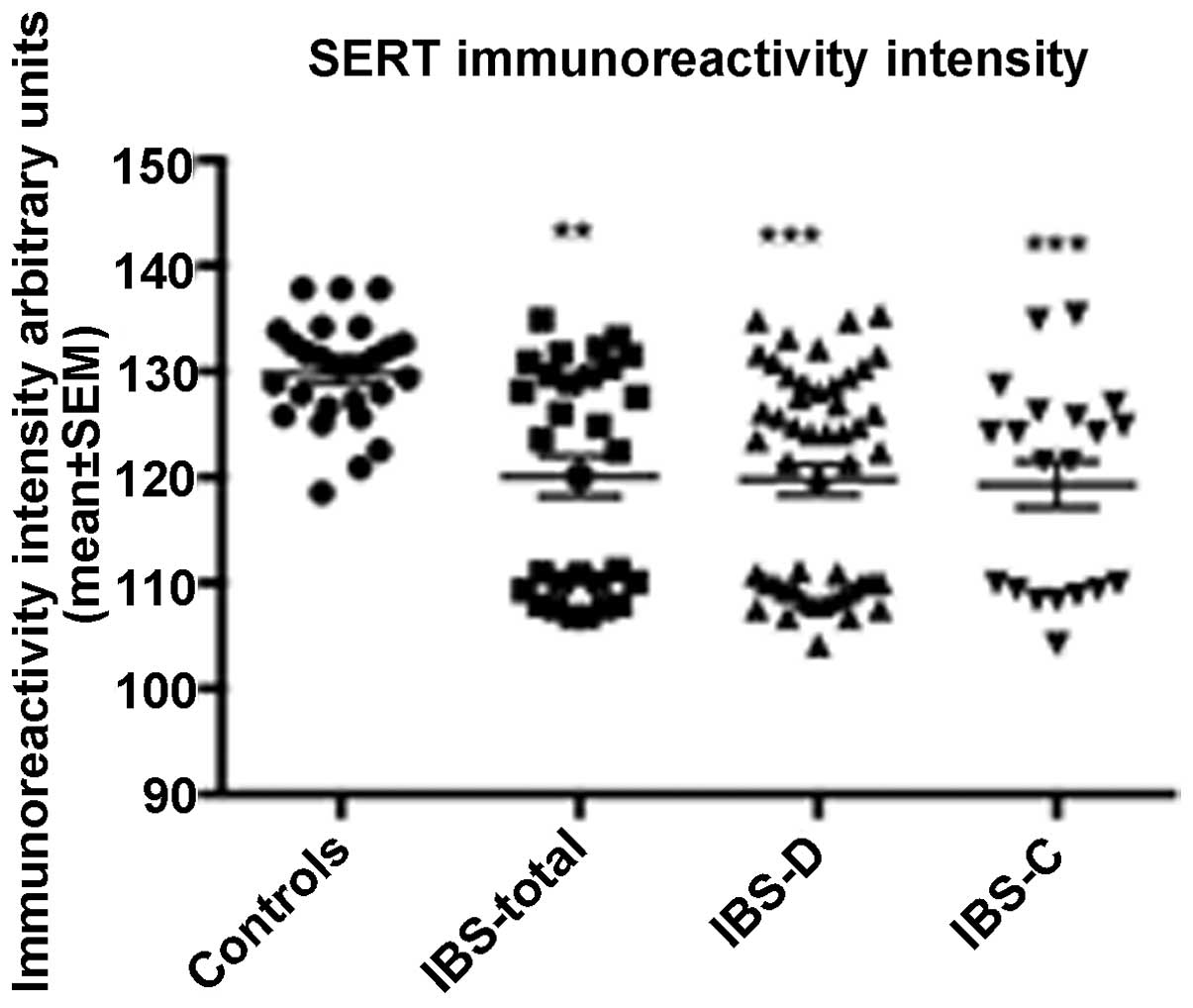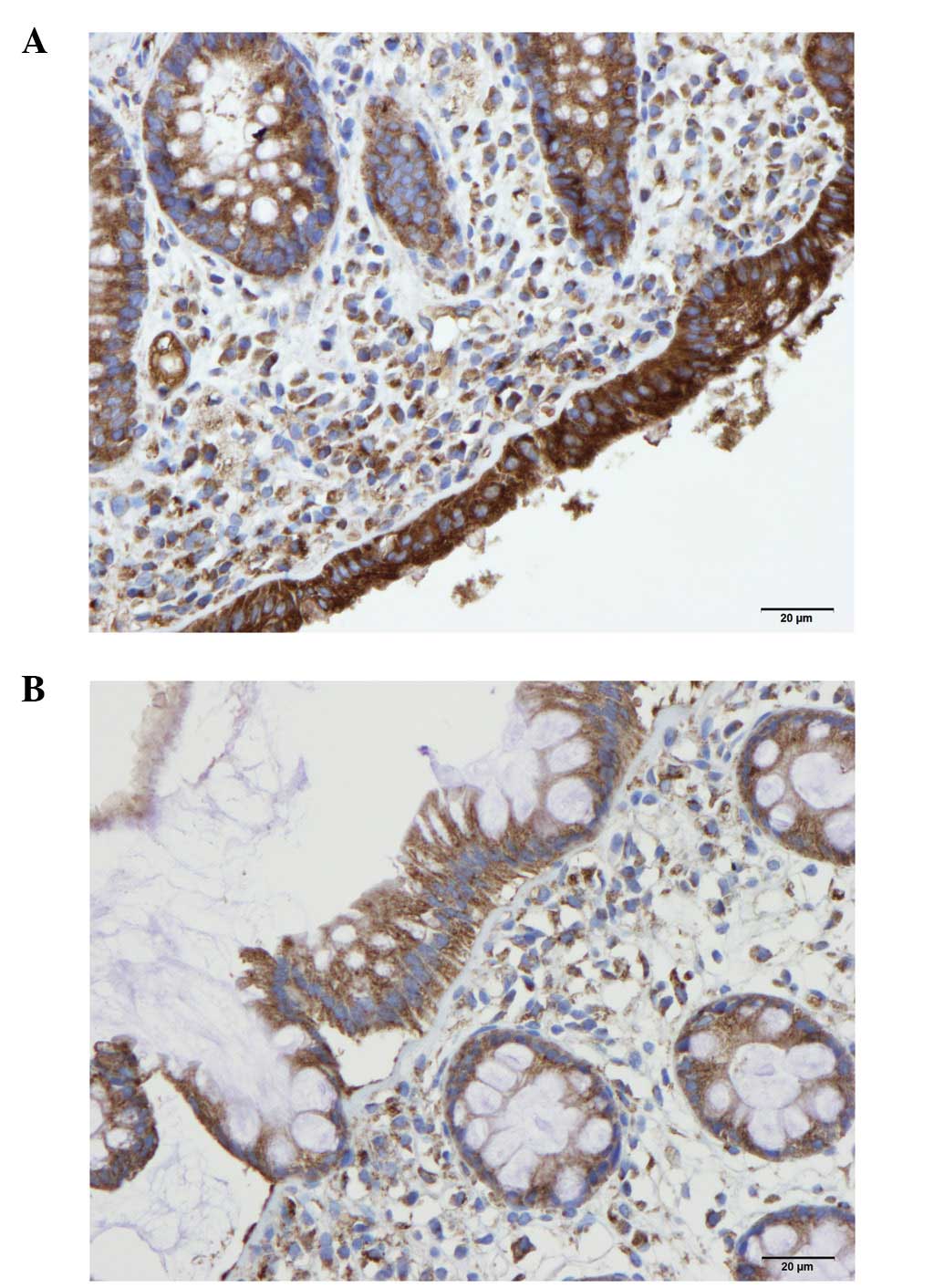|
1
|
Thompson WG: A world view of IBS.
Irritable Bowel Syndrome. Camilleri M and Spiller RC: Saunders;
Philadelphia and London: pp. 17–26. 2002
|
|
2
|
Drossman DA, Li Z, Andruzzi E, et al: U.S.
householder survey of functional gastrointestinal disorders.
Prevalence, sociodemography, and health impact. Dig Dis Sci.
38:1569–1580. 1993. View Article : Google Scholar : PubMed/NCBI
|
|
3
|
El-Salhy M, Gundersen D, Hatlebakk JG and
Hausken T: Irritable Bowel Syndrome: Diagnosis, Pathogenesis and
Treatment Options. Nova Science Publishers Inc; New York: 2012
|
|
4
|
Ford AC and Vandvik PO: Irritable bowel
syndrome. Clin Evid (Online). 2012:pii04102012.
|
|
5
|
Lovell RM and Ford AC: Global prevalence
of and risk factors for irritable bowel syndrome: a meta-analysis.
Clin Gastroenterol Hepatol. 10:712–721.e4. 2012. View Article : Google Scholar : PubMed/NCBI
|
|
6
|
Quigley EM, Locke GR, Mueller-Lissner S,
et al: Prevalence and management of abdominal cramping and pain: a
multinational survey. Aliment Pharmacol Ther. 24:411–419. 2006.
View Article : Google Scholar : PubMed/NCBI
|
|
7
|
Vandvik PO, Lydersen S and Farup PG:
Prevalence, comorbidity and impact of irritable bowel syndrome in
Norway. Scand J Gastroenterol. 41:650–656. 2006. View Article : Google Scholar : PubMed/NCBI
|
|
8
|
Saito YA, Schoenfeld P and Locke GR 3rd:
The epidemiology of irritable bowel syndrome in North America: a
systematic review. Am J Gastroenterol. 97:1910–1915.
2002.PubMed/NCBI
|
|
9
|
Whitehead WE, Burnett CK, Cook EW 3rd and
Taub E: Impact of irritable bowel syndrome on quality of life. Dig
Dis Sci. 41:2248–2253. 1996. View Article : Google Scholar : PubMed/NCBI
|
|
10
|
Agreus L, Svardsudd K, Nyren O and Tibblin
G: Irritable bowel syndrome and dyspepsia in the general
population: overlap and lack of stability over time.
Gastroenterology. 109:671–680. 1995. View Article : Google Scholar : PubMed/NCBI
|
|
11
|
Thompson WG and Heaton KW: Functional
bowel disorders in apparently healthy people. Gastroenterology.
79:283–288. 1980.PubMed/NCBI
|
|
12
|
Kennedy TM, Jones RH, Hungin AP,
O’Flanagan H and Kelly P: Irritable bowel syndrome,
gastro-oesophageal reflux, and bronchial hyper-responsiveness in
the general population. Gut. 43:770–774. 1998. View Article : Google Scholar : PubMed/NCBI
|
|
13
|
Talley NJ, Gabriel SE, Harmsen WS,
Zinsmeister AR and Evans RW: Medical costs in community subjects
with irritable bowel syndrome. Gastroenterology. 109:1736–1741.
1995. View Article : Google Scholar : PubMed/NCBI
|
|
14
|
Hungin AP, Whorwell PJ, Tack J and Mearin
F: The prevalence, patterns and impact of irritable bowel syndrome:
an international survey of 40,000 subjects. Aliment Pharmacol Ther.
17:643–650. 2003. View Article : Google Scholar : PubMed/NCBI
|
|
15
|
Jones R and Lydeard S: Irritable bowel
syndrome in the general population. BMJ. 304:87–90. 1992.
View Article : Google Scholar : PubMed/NCBI
|
|
16
|
Bordie AK: Functional disorders of the
colon. J Indian Med Assoc. 58:451–456. 1972.PubMed/NCBI
|
|
17
|
O’Keefe EA, Talley NJ, Zinsmeister AR and
Jacobsen SJ: Bowel disorders impair functional status and quality
of life in the elderly: a population-based study. J Gerontol A Biol
Sci Med Sci. 50:M184–M189. 1995.PubMed/NCBI
|
|
18
|
Everhart JE and Renault PF: Irritable
bowel syndrome in office-based practice in the United States.
Gastroenterology. 100:998–1005. 1991.PubMed/NCBI
|
|
19
|
Wilson S, Roberts L, Roalfe A, Bridge P
and Singh S: Prevalence of irritable bowel syndrome: a community
survey. Br J Gen Pract. 54:495–502. 2004.PubMed/NCBI
|
|
20
|
Harvey RF, Salih SY and Read AE: Organic
and functional disorders in 2000 gastroenterology outpatients.
Lancet. 1:632–634. 1983. View Article : Google Scholar : PubMed/NCBI
|
|
21
|
Spiegel BM: The burden of IBS: looking at
metrics. Curr Gastroenterol Rep. 11:265–269. 2009. View Article : Google Scholar : PubMed/NCBI
|
|
22
|
Longstreth GF, Thompson WG, Chey WD,
Houghton LA, Mearin F and Spiller RC: Functional bowel disorders.
Gastroenterology. 130:1480–1491. 2006. View Article : Google Scholar : PubMed/NCBI
|
|
23
|
Drossman DA: Rome III: the new criteria.
Chin J Dig Dis. 7:181–185. 2006. View Article : Google Scholar : PubMed/NCBI
|
|
24
|
Harvey RF, Mauad EC and Brown AM:
Prognosis in the irritable bowel syndrome: a 5-year prospective
study. Lancet. 1:963–965. 1987.PubMed/NCBI
|
|
25
|
Norgaard M, Farkas DK, Pedersen L, et al:
Irritable bowel syndrome and risk of colorectal cancer: a Danish
nationwide cohort study. Br J Cancer. 104:1202–1206. 2011.
View Article : Google Scholar : PubMed/NCBI
|
|
26
|
Sloth H and Jorgensen LS: Chronic
non-organic upper abdominal pain: diagnostic safety and prognosis
of gastrointestinal and non-intestinal symptoms. A 5- to 7-year
follow-up study. Scand J Gastroenterol. 23:1275–1280.
1988.PubMed/NCBI
|
|
27
|
Pace F, Molteni P, Bollani S, et al:
Inflammatory bowel disease versus irritable bowel syndrome: a
hospital-based, case-control study of disease impact on quality of
life. Scand J Gastroenterol. 38:1031–1038. 2003. View Article : Google Scholar : PubMed/NCBI
|
|
28
|
Gralnek IM, Hays RD, Kilbourne A, Naliboff
B and Mayer EA: The impact of irritable bowel syndrome on
health-related quality of life. Gastroenterology. 119:654–660.
2000. View Article : Google Scholar : PubMed/NCBI
|
|
29
|
Drossman DA, Morris CB, Schneck S, et al:
International survey of patients with IBS: symptom features and
their severity, health status, treatments, and risk taking to
achieve clinical benefit. J Clin Gastroenterol. 43:541–550. 2009.
View Article : Google Scholar : PubMed/NCBI
|
|
30
|
Sandler RS, Everhart JE, Donowitz M, et
al: The burden of selected digestive diseases in the United States.
Gastroenterology. 122:1500–1511. 2002. View Article : Google Scholar : PubMed/NCBI
|
|
31
|
Coates MD, Johnson AC, Greenwood-Van
Meerveld B and Mawe GM: Effects of serotonin transporter inhibition
on gastrointestinal motility and colonic sensitivity in the mouse.
Neurogastroenterol Motil. 18:464–471. 2006. View Article : Google Scholar : PubMed/NCBI
|
|
32
|
Wang SH, Dong L, Luo JY, et al: Decreased
expression of serotonin in the jejunum and increased numbers of
mast cells in the terminal ileum in patients with irritable bowel
syndrome. World J Gastroenterol. 13:6041–6047. 2007. View Article : Google Scholar : PubMed/NCBI
|
|
33
|
Kim HS, Lim JH, Park H and Lee SI:
Increased immunoendocrine cells in intestinal mucosa of
postinfectious irritable bowel syndrome patients 3 years after
acute Shigella infection - an observation in a small case control
study. Yonsei Med J. 51:45–51. 2010.
|
|
34
|
Lee KJ, Kim YB, Kim JH, Kwon HC, Kim DK
and Cho SW: The alteration of enterochromaffin cell, mast cell, and
lamina propria T lymphocyte numbers in irritable bowel syndrome and
its relationship with psychological factors. J Gastroenterol
Hepatol. 23:1689–1694. 2008. View Article : Google Scholar : PubMed/NCBI
|
|
35
|
Park JH, Rhee PL, Kim G, et al:
Enteroendocrine cell counts correlate with visceral
hypersensitivity in patients with diarrhoea-predominant irritable
bowel syndrome. Neurogastroenterol Motil. 18:539–546. 2006.
View Article : Google Scholar : PubMed/NCBI
|
|
36
|
Dunlop SP, Jenkins D, Neal KR and Spiller
RC: Relative importance of enterochromaffin cell hyperplasia,
anxiety, and depression in postinfectious IBS. Gastroenterology.
125:1651–1659. 2003. View Article : Google Scholar : PubMed/NCBI
|
|
37
|
Spiller RC, Jenkins D, Thornley JP, et al:
Increased rectal mucosal enteroendocrine cells, T lymphocytes, and
increased gut permeability following acute Campylobacter enteritis
and in post-dysenteric irritable bowel syndrome. Gut. 47:804–811.
2000. View Article : Google Scholar
|
|
38
|
El-Salhy M, Lomholt-Beck B and Hausken T:
Chromogranin A as a possible tool in the diagnosis of irritable
bowel syndrome. Scand J Gastroenterol. 45:1435–1439. 2010.
View Article : Google Scholar : PubMed/NCBI
|
|
39
|
El-Salhy M, Mazzawi T, Gundersen D and
Hausken T: Chromogranin A cell density in the rectum of patients
with irritable bowel syndrome. Mol Med Rep. 6:1223–1225.
2012.PubMed/NCBI
|
|
40
|
El-Salhy M, Lillebo E, Reinemo A and
Salmelid L: Ghrelin in patients with irritable bowel syndrome. Int
J Mol Med. 23:703–707. 2009. View Article : Google Scholar : PubMed/NCBI
|
|
41
|
Dizdar V, Spiller R, Singh G, et al:
Relative importance of abnormalities of CCK and 5-HT (serotonin) in
Giardia-induced post-infectious irritable bowel syndrome and
functional dyspepsia. Aliment Pharmacol Ther. 31:883–891.
2010.PubMed/NCBI
|
|
42
|
El-Salhy M, Vaali K, Dizdar V and Hausken
T: Abnormal small-intestinal endocrine cells in patients with
irritable bowel syndrome. Dig Dis Sci. 55:3508–3513. 2010.
View Article : Google Scholar : PubMed/NCBI
|
|
43
|
El-Salhy M, Gundersen D, Ostgaard H,
Lomholt-Beck B, Hatlebakk JG and Hausken T: Low densities of
serotonin and peptide YY cells in the colon of patients with
irritable bowel syndrome. Dig Dis Sci. 57:873–878. 2012. View Article : Google Scholar : PubMed/NCBI
|
|
44
|
El-Salhy M and Mahdavi J: Image analysis
of the duodenal endocrine cells in mice with special reference to
optic densitomertry. Ups J Med Sci. 102:175–184. 1997. View Article : Google Scholar
|
|
45
|
Coates MD, Mahoney CR, Linden DR, et al:
Molecular defects in mucosal serotonin content and decreased
serotonin reuptake transporter in ulcerative colitis and irritable
bowel syndrome. Gastroenterology. 126:1657–1664. 2004. View Article : Google Scholar
|
|
46
|
Mawe GM, Coates MD and Moses PL: Review
article: intestinal serotonin signalling in irritable bowel
syndrome. Aliment Pharmacol Ther. 23:1067–1076. 2006. View Article : Google Scholar : PubMed/NCBI
|
|
47
|
Erspamer V: Occurrence and distribution of
5-hydroxytryptamine (enteramine) in the living organism. Z Vitam
Horm Fermentforsch. 9:74–96. 1957.PubMed/NCBI
|
|
48
|
Chen JX, Pan H, Rothman TP, Wade PR and
Gershon MD: Guinea pig 5-HT transporter: cloning, expression,
distribution, and function in intestinal sensory reception. Am J
Physiol. 275:G433–G448. 1998.PubMed/NCBI
|
|
49
|
Spiller R and Lam C: An update on
post-infectious irritable bowel syndrome: role of genetics, immune
activation, serotonin and altered microbiome. J Neurogastroenterol
Motil. 18:258–268. 2012. View Article : Google Scholar : PubMed/NCBI
|
|
50
|
Keating C, Beyak M, Foley S, et al:
Afferent hypersensitivity in a mouse model of post-inflammatory gut
dysfunction: role of altered serotonin metabolism. J Physiol.
586:4517–4530. 2008. View Article : Google Scholar : PubMed/NCBI
|
|
51
|
Coleman NS, Foley S, Dunlop SP, et al:
Abnormalities of serotonin metabolism and their relation to
symptoms in untreated celiac disease. Clin Gastroenterol Hepatol.
4:874–881. 2006. View Article : Google Scholar : PubMed/NCBI
|
|
52
|
Wade PR, Chen J, Jaffe B, Kassem IS,
Blakely RD and Gershon MD: Localization and function of a 5-HT
transporter in crypt epithelia of the gastrointestinal tract. J
Neurosc. 16:2352–2364. 1996.PubMed/NCBI
|
|
53
|
Chen JJ, Li Z, Pan H, et al: Maintenance
of serotonin in the intestinal mucosa and ganglia of mice that lack
the high-affinity serotonin transporter: abnormal intestinal
motility and the expression of cation transporters. J Neurosci.
21:6348–6361. 2001.PubMed/NCBI
|
|
54
|
Faure C, Patey N, Gauthier C, Brooks EM
and Mawe GM: Serotonin signaling is altered in irritable bowel
syndrome with diarrhea but not in functional dyspepsia in pediatric
age patients. Gastroenterology. 139:249–258. 2010. View Article : Google Scholar : PubMed/NCBI
|
|
55
|
Kim HJ, Camilleri M, Carlson PJ, et al:
Association of distinct alpha(2) adrenoceptor and serotonin
transporter polymorphisms with constipation and somatic symptoms in
functional gastrointestinal disorders. Gut. 53:829–837. 2004.
View Article : Google Scholar
|
|
56
|
Camilleri M, Andrews CN, Bharucha AE, et
al: Alterations in expression of p11 and SERT in mucosal biopsy
specimens of patients with irritable bowel syndrome.
Gastroenterology. 132:17–25. 2007. View Article : Google Scholar : PubMed/NCBI
|
|
57
|
Camilleri M, Busciglio I, Carlson P, et
al: Candidate genes and sensory functions in health and irritable
bowel syndrome. Am J Physiol Gastrointest Liver Physiol.
295:G219–G225. 2008. View Article : Google Scholar : PubMed/NCBI
|
|
58
|
Kumar S, Ranjan P, Mittal B and Ghoshal
UC: Serotonin transporter gene (SLC6A4) polymorphism in patients
with irritable bowel syndrome and healthy controls. J
Gastrointestin Liver Dis. 21:31–38. 2012.PubMed/NCBI
|
|
59
|
Park JM, Choi MG, Park JA, et al:
Serotonin transporter gene polymorphism and irritable bowel
syndrome. Neurogastroenterol Motil. 18:995–1000. 2006. View Article : Google Scholar : PubMed/NCBI
|
|
60
|
Saito YA, Locke GR 3rd, Zimmerman JM, et
al: A genetic association study of 5-HTT LPR and GNbeta3 C825T
polymorphisms with irritable bowel syndrome. Neurogastroenterol
Motil. 19:465–470. 2007. View Article : Google Scholar : PubMed/NCBI
|
|
61
|
Colucci R, Blandizzi C, Bellini M, Ghisu
N, Tonini M and Del Tacca M: The genetics of the serotonin
transporter and irritable bowel syndrome. Trends in molecular
medicine. 14:295–304. 2008. View Article : Google Scholar : PubMed/NCBI
|
|
62
|
Colucci R, Gambaccini D, Ghisu N, et al:
Influence of the serotonin transporter 5HTTLPR polymorphism on
symptom severity in irritable bowel syndrome. PloS One.
8:e548312013. View Article : Google Scholar : PubMed/NCBI
|
|
63
|
Park MI and Camilleri M: Is there a role
of food allergy in irritable bowel syndrome and functional
dyspepsia? A systematic review. Neurogastroenterol Motil.
18:595–607. 2006. View Article : Google Scholar : PubMed/NCBI
|


















